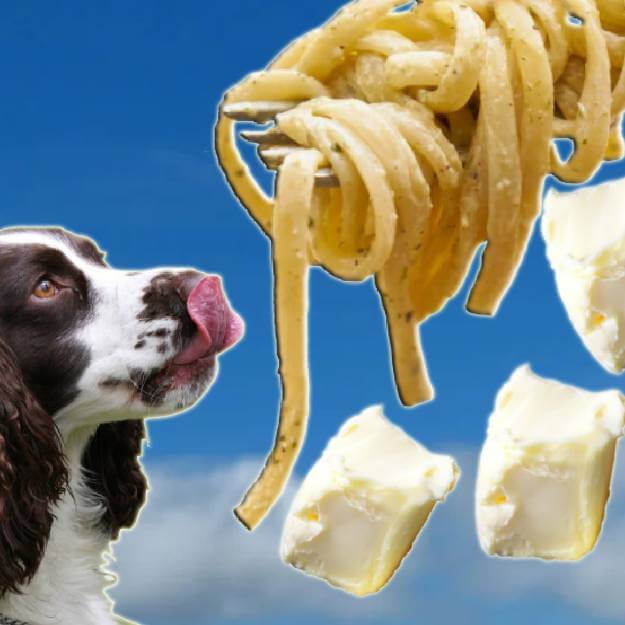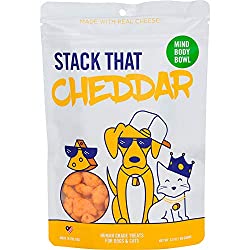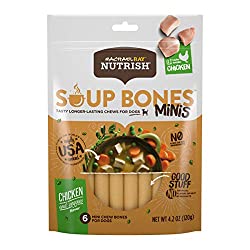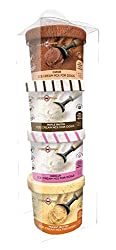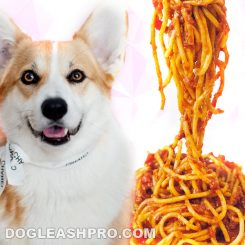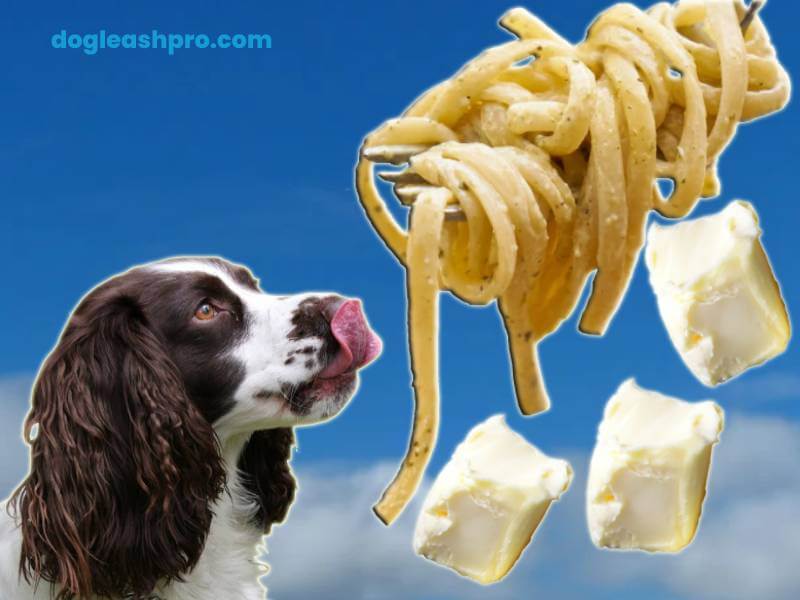
No, dogs should not eat Alfredo because its main ingredients (butter, onion, and garlic) are toxic to dogs. Even a small amount can do damage to your canine’s body so it is best not to feed your pup Alfredo.
Alfredo is known for its large dairy content which is what makes it very creamy and delicious in pasta. However, it is because of this that makes it harmful to our canine friends.
Table of Contents
What is Alfredo?
Alfredo is a rich white pasta sauce that is made with heavy cream (or heavy whipping cream), minced garlic, butter, Parmesan cheese, and parsley. The best type of pasta for Alfredo is the traditional pasta, fettuccine. Fettuccine is the best type of pasta for Alfredo because it can withstand and hold the heavy cheese and butter fat.
What is in Alfredo?
If you have one pound of broad fresh egg pasta, then here are the specific ingredients with its measurement that you will need:
- 6 tablespoons of unsalted butter.
- 1.75 cups or 400 milliliters (mL) of heavy cream.
- 8.5 ounces or 240 grams of Parmesan cheese (alternatively, you could use Asiago cheese).
- 1 teaspoon of salt.
- Black pepper.
- A pinch of fresh ground nutmeg.
Let’s discuss these specific ingredients in detail and understand why Alfredo is dangerous to dogs.
Unsalted butter (Not safe)
Butter in general is not safe for dogs. It doesn’t matter if the butter is salted or unsalted. While unsalted butter is a safer option for your canine, if your canine is lactose intolerant (as most dogs are), then he is not capable of properly digesting dairy products. Butter is made from the protein and fat component of cream or milk and it is mainly saturated fat. In fact, it is 80% butterfat.
When it comes to calories, butter is 99% fat with only 1% of protein. For instance, in a 100 gram serving of butter, almost 50 grams are saturated fats. In just one tablespoon of butter, there are 12 grams of fat.
Additionally, the fatty oils in butter do not offer any health benefits to your dog. Any essential vitamins or minerals from this butter can be found in healthier dog foods.
If you have a 30-pound dog (medium-sized), he just needs about 12 grams of fat every day to maintain a healthy diet. Therefore, even a small tiny bite of butter could go over his required daily fat content. This is why it’s best to avoid feeding your dog any butter altogether.
If you must, giving your pup a tiny slather of butter as an occasional treat is best.
If he accidentally licks a little bit of butter off of your mixing bowl, he should be fine but try to keep butter out of your pup’s reach.
If your pup accidentally bites off a good chunk of the butter stick or tub of butter, he will experience the following symptoms:
- Upset stomach for 3 to 4 days.
- Constipation or irregular bowel movements for 3 to 4 days.
- Ingestion.
- Gas.
- Bloating.
- Diarrhea.
Be sure to contact your veterinarian immediately if your four-legged friend is showing these signs.
Make sure this is not a repeated daily offense. Since butter is high in calories, consuming butter frequently can cause your pup to gain weight and this will lead to canine obesity.
So it’s best that you do not feed your canine friend any Alfredo since it is loaded with butter.
Heavy cream (Harmful)
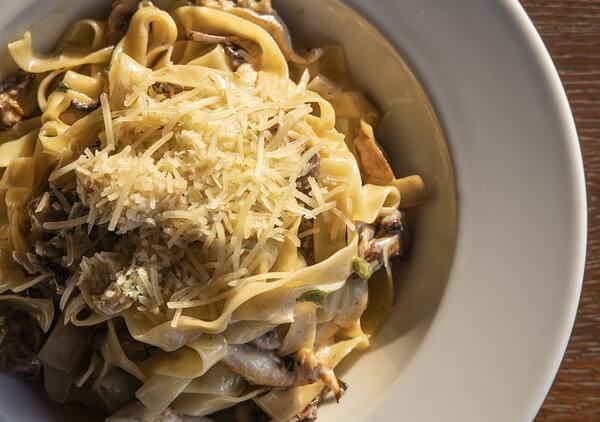
Heavy cream is a dairy product and similar to butter, it is difficult for your dog’s body to properly digest heavy cream. Most dogs that are lactose intolerant do not have the sufficient lactase enzyme to break down dairy products like heavy cream.
If your pup is lactose intolerant and accidentally consume heavy cream, here are some symptoms to look out for:
- Diarrhea.
- Constant passing of gas.
- Vomiting.
- Liquid or loose stool.
Avoid giving Alfredo to your furry friends if they are lactose intolerant, overweight, or have diabetes. Alfredo is packed with heavy cream and it is not healthy for dogs.
Parmesan cheese (Harmful)
Alfredo contains a generous amount of Parmesan cheese which is why your dog should stay away from Alfredo.
Parmesan cheese contains high levels of salt so it’s not the best cheese choice for your canine companion. Too much sodium in your dog’s body can initially cause high blood pressure and eventually lead to organ damage in the long term.
In addition, cheese has a high-fat content. Dogs that eat cheese regularly can gain weight and become obese. This is why you should keep the Parmesan cheese away from your dog’s reach.
Hint: When it comes to cheese, be aware that some cheeses do contain flavoring or herbs that are harmful to dogs, including onions, garlic, and chives. Cheese is made for human consumption and many human foods like Pepperoni contain these toxic ingredients that can damage your dog’s health.
Asiago cheese (Harmful)
Some people prefer to use asiago cheese over parmesan cheese in their Alfredo. While cheese is packed with calcium, protein, essential fatty acids, vitamin A and B vitamins, dogs can find these health benefits from their regular dog food.
If your dog loves cheese, it’s best to give them low-fat cheeses. We’re talking soft goat cheese, cottage cheese, and mozzarella cheese. Cottage cheese is low in sodium and fat when compared to other cheese like asiago or parmesan cheese. Another great news about cottage cheese is that it is low in lactose so it’s easier to digest.
If you’re swapping parmesan cheese with asiago cheese, that means your Alfredo will contain a lot of asiago cheese and it’s best that you avoid giving your canine friend Alfredo.
Salt (Harmful)
In this case, if you’re making Alfredo for a pound of fresh pasta, then you’ll need 1 teaspoon of salt. While 1 teaspoon of salt is not enough to cause salt poisoning in humans, it can harm your pooch and he may have hypernatremia or salt poisoning.
Dogs only require 0.25g to 1.5g per 100g of dog food. This is considered a healthy level of salt in your pup’s diet.
Feeding your pooch Alfredo that contains 1 teaspoon of salt would equate to 5.9g of salt. As you can see, this is way more salt than your dog requires.
So if you’re making Alfredo with that much salt, it’s best to not give Alfredo to your furry friend.
Black pepper (Mostly safe in moderation)
Black pepper is a common seasoning used in Alfredo. While a small amount of pepper is fine for dogs, if you seasoned your Alfredo with a lot of black pepper, keep your Alfredo away from your four-legged friends.
Nutmeg (Harmful)

If you add nutmeg to your Alfredo, please avoid feeding Alfredo to your pup. Nutmeg is harmful to dogs because it contains a toxin called myristicin. This toxin is found in the oil of the nutmeg seed.
Consuming a large amount of nutmeg can have harmful consequences in dogs. Even a small amount of nutmeg can cause the following symptoms:
- Upset stomach.
- Vomiting.
- Diarrhea.
- Biting frantically.
- Hallucinations.
- Look lost or disoriented.
- Confused or staring off into space.
- Nipping furiously.
- Fast heart rate.
- Barking or panting.
- Dehydration or dry mouth.
- Lethargic.
- Show behavior of fearfulness.
- Muscle spasm or tremors.
If your pooch accidentally consumes food that contains nutmeg, be sure to observe him carefully for a few hours to see if he is showing any signs or symptoms. If he is showing signs of nutmeg toxicity, bring him to the vet as soon as possible.
Dog-friendly alternatives to Alfredo
If your puppy loves cheese or the creamy flavor of butter, here are some canine-friendly dog treats or snacks to consider giving them instead:
So, can dogs eat Alfredo?
It’s best if you do not serve your dog any food with Alfredo in it. Alfredo contain dairy products that is difficult for dogs to digest and it has a high fat content due to the butter, cream, and cheese used. Additionally, seasonings and spices like nutmeg and salt can cause poisoning.
Instead of giving your pup Alfredo, opt for a more canine-friendly food option.
Related Questions
No, dogs should not eat fettuccine Alfredo. Fettuccine is a type of pasta that is long, thick, and shaped like a flat ribbon. In fact, fettuccine in Italian means small ribbons. While cooked fettuccine pasta is safe for dogs to eat, it is the Alfredo that your pup should not eat. So dogs can eat fettuccine as long as it does not have Alfredo in it.
Be sure that the fettuccine does not contain a lot of salt or sugar because both of these ingredients can upset your dog’s stomach. If your pups are not allergic to wheat, they can safely eat fettuccine.
Alfredo noodles mean there is Alfredo added to the noodle. If this is the case, then no, dogs can not eat Alfredo noodles and should avoid it at all costs.
No, dogs should not eat Alfredo pasta. Alfredo pasta contains Alfredo, which is not safe or healthy for dogs. Try not to give your dog Alfredo pasta.
No, dogs should not eat shrimp fettuccine Alfredo. Shrimp fettuccine Alfredo means that the shrimp is covered in Alfredo, which is not safe for dogs.
Dogs can eat plain fully cooked shrimp with the shells peeled off. However, if it’s mixed with Alfredo and fettuccine pasta, it may go over your dog’s daily caloric diet. Avoid feeding your pup any food that contains Alfredo in it.
No, dogs should avoid chicken Alfredo. Chicken Alfredo means there is Alfredo in the dish, which is not beneficial for dogs. If the chicken is not covered in Alfredo, then that is safe to give your dog.
DISCLAIMER: THIS WEBSITE DOES NOT PROVIDE MEDICAL ADVICE
The information, including but not limited to, text, graphics, images and other material contained on this website are for informational purposes only. No material on this site is intended to be a substitute for professional veterinary advice, diagnosis, or treatment. Always seek the advice of your veterinarian or other qualified health care provider with any questions you may have regarding dietary needs.
Resources:

With over five years of specialized experience as an animal writer, my expertise lies in dog nutrition, health, behavior, grooming, and training. I am dedicated to delivering helpful and informative content that caters to the well-being of our furry friends. My primary goal is to empower pet owners with knowledge and ensure our canine companions thrive in health and happiness. In my free time, I love volunteering at local dog rescue centers.
